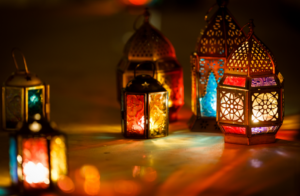Ramadan 2022 - Information and Advice for Supporting Colleagues and Clients
Ramadan 2022 – Information and Advice for Supporting Colleagues and Clients

The Islamic holy month of Ramadan is right around the corner, expected to begin this Saturday 2nd April 2022, depending on the sighting of the moon. We wanted to share some information about what Ramadan is, as well as some useful and inclusive ways to speak to and support colleagues during this time.
What is Ramadan?
Ramadan is a month-long festival that’s imbedded in many cultures. Islam extends all over the world, and each Muslim ethnic group has their own way of celebrating with traditional customs and cuisines.
As the Islamic calendar is based around the lunar cycle, the Holy month of Ramadan rotates by approximately ten days each year. For Muslims, Ramadan is a period of introspection, communal prayer (ṣalāt) in the mosque, and reading of the Qurʾān.
The Fourth Pillar of Islam is Sawm, or fasting, and so Muslims fast during the month of Ramadan. Muslims will refrain from food, drink (including water), smoking and sexual intercourse from sunrise to sunset.
After the sunset prayer, Muslims gather in their homes or mosques to break their fast with a meal called ifṭār that is often shared with friends and extended family. (Britannica)
As well as fasting, there is also an increase in worship for Muslims, with extra congregational prayers performed in mosques each night during Ramadan. The person leading the prayer (imam) will recite the entire Qur’an from memory over the month.
Laylat-ul-Qadr is the most holy night for Muslims and is translated as the ‘Night of Power’, when Muslims are encouraged to increase their worship, and some may do so throughout the night. Islamic traditions state that if this night is spent in devotion, it is equivalent to a thousand months in prayer. Laylat-ul-Qadr occurs on one of the last 10 odd-numbered nights of Ramadan, although the exact date is not known.
Eid al-Fitr is the first of two Eids of the Islamic (lunar) calendar year and the officially marks the end of Ramadan. The exact timing is based on the sighting of the moon. Eid-al-Fitr (also written and pronounced as Eid-ul-Fitr.
Eid-al-Fitr is a time of celebration, with Muslims gathering their friends and family to show gratitude toward God following the previous month of reflection. The holiday acts as a reminder for Muslims to be grateful for what they have, and to share with those who may be less fortunate.
As well as giving thanks, Muslims give an obligatory payment to charity (zakat al-Fitr), As with Eid-al-Adha, gifting is a big part of Eid celebrations. Children receive eidia offerings in money bags, and sweet treats such as cookies and dates are exchanged among loved ones, neighbours, colleagues, friends and even strangers. (The Culture Trip)
Our Equality, Diversity and Inclusion Coordinator, Emily Brenson, says:
“At Inspire North, it’s important we are inclusive and support of our colleagues and clients who will be participating in Ramadan. For those of us aren’t of the Islamic faith, now is the time for us to educate ourselves on what Ramadan means so we can make sure our Muslim colleagues and clients feel safe to express their faith at this time, and always. This is the perfect opportunity to have conversations with your teams, and I wish our colleagues and clients the very best during this Holy period”.
How can we support our Muslim colleagues during Ramadan?
The majority of Muslims continue with their day-to-day duties throughout Ramadan and so it’s important to be sensitive to the needs of our colleagues and clients during this time.
Asif Sadiq MBE has provided some useful advice including things like considering avoiding meetings over lunchtime and planning strenuous tasks or activities, if people are not eating for many hours, will not want to sit whilst others are eating and may feel physically weaker than usual.
Ramadan isn’t always an indication of how religious someone is, it is a cultural and spiritual time, and many Muslims who are not observant during the rest of the year may choose to observe Ramadan. It’s also important not to make assumptions, as not all Muslims will be fasting. This could be due to health reasons, so avoid asking why this is, as the individual doesn’t need to justify themselves.
We must respect this holy time for Muslims and try not use negative language, even if it is meant well. For example, saying ‘poor you’ may be deemed patronising. Instead, share your admiration to the individual’s discipline and commitment.
Ask your colleagues if there’s anything you can do to support them and remember that everybody need breaks throughout the day, even if they’re not eating!
Sources:
https://www.britannica.com/topic/Ramadan
https://theculturetrip.com/middle-east/articles/so-what-exactly-is-eid-al-fitr/
https://www.linkedin.com/pulse/ramadan-what-do-you-need-know-asif-sadiq-mbe/
